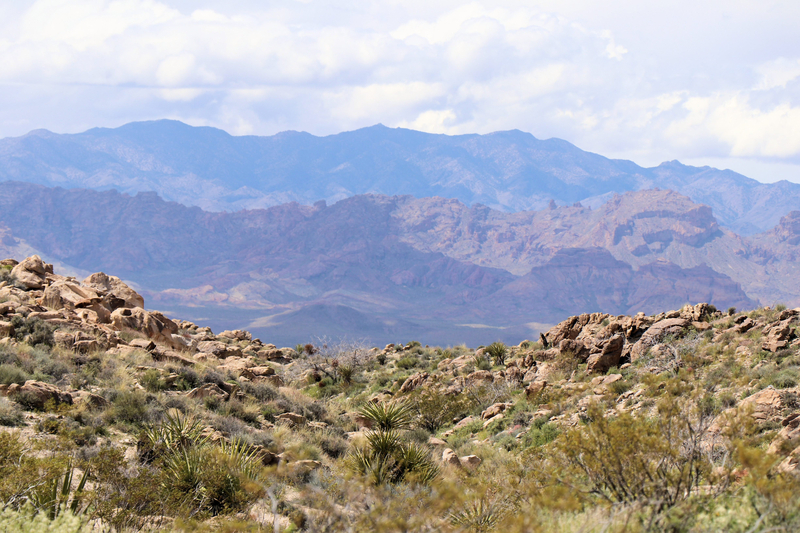
- Details
- By Darren Thompson
The site, Avi Kwa Ame — which translates to “Spirit Mountain “in the Mojave language — was proclaimed a National Monument by President Biden on Tuesday, March 21, 2023. The area includes more than 500,000 acres and is the largest monument the President has designated to date.
It’s the second national monument explicitly created to protect and preserve land that is significant to Indigenous culture. The first was the Bears Ears National Monument in Utah by former President Barack Obama on December 28, 2016.
“I am overjoyed to be here alongside the Nevada Congressional delegation, advocates and partners from across the region as we gather to celebrate this historic designation of Avi Kwa Ame National Monument,” said Secretary of Interior Debra Haaland during Friday’s dedication ceremony. “This is what community-led conservation looks like.”
The national monument will be managed jointly by the Bureau of Land Management and the National Park Service, said Haaland.
Haaland spoke with tears in her eyes when she thanked all who advocated for the dedication of the national monument.
“These dedicated teams will preserve these lands for generations to come,” she said. “I am incredibly grateful for everything these public servants who do everything they can to preserve America’s public lands.”
The Cocopah, Quechuan, Hopi and the Fort Mojave Indian Tribes—Yuman-speaking tribes— consider Avi Kwa Ame the site of their creation. Tribes and conservation organizations and local and state leaders have been advocating to designate the area a national monument for more than fifteen years. Nearly 33,000 acres of the region were already protected under the 1964 Wilderness Act.
“For them [the Tribes], it is one of the most sacred places on earth,” Haaland said. “It is the source of life and the source of creation.”
The monument is also one of the most ecologically diverse regions in the country, and preservation is an effort to combat climate change. According to a fact sheet shared with Native News Online, preserving the region would protect a migratory path for desert bighorn sheep and mule deer and protect the critical habitat of other desert animals such as tortoises, bald eagles, golden eagles, peregrine falcons, and plant life. The area also has one of the most extensive Joshua tree forests in the U.S.
Its preservation may also put a stop to wind and solar projects.
When President Biden signed the national monument into law through the Antiquities Act of 1906, Nevada Governor Joe Lombardo issued a statement citing the extraction of rare earth mineral mining projects and other development efforts in the region.
“The federal confiscation of 506,814 acres of Nevada land is a historic mistake that will cost Nevadans for generations to come,” said Nevada Governor Joe Lombardo in a statement on Tuesday, March 21, 2023.
More Stories Like This
Trump signs law that revokes some limits on drilling in Alaska’s National Petroleum ReserveSouthern Sierra Miwuk Nation Gets 900-Acres ofLand Back
Chilkat Indian Village Tells New Palmer Mine Owners They Are “Not Welcome” in Chilkat Valley
Tribes, Coastal Group Ask Army Corps to Revoke Permit for Texas Export Terminal
Michigan Tribes Tell Supreme Court: Don’t Bail Out Enbridge
Help us defend tribal sovereignty.
At Native News Online, our mission is rooted in telling the stories that strengthen sovereignty and uplift Indigenous voices — not just at year’s end, but every single day.
Because of your generosity last year, we were able to keep our reporters on the ground in tribal communities, at national gatherings and in the halls of Congress — covering the issues that matter most to Indian Country: sovereignty, culture, education, health and economic opportunity.
That support sustained us through a tough year in 2025. Now, as we look to the year ahead, we need your help right now to ensure warrior journalism remains strong — reporting that defends tribal sovereignty, amplifies Native truth, and holds power accountable.
 The stakes couldn't be higher. Your support keeps Native voices heard, Native stories told and Native sovereignty defended.
The stakes couldn't be higher. Your support keeps Native voices heard, Native stories told and Native sovereignty defended.
Stand with Warrior Journalism today.
Levi Rickert (Potawatomi), Editor & Publisher

